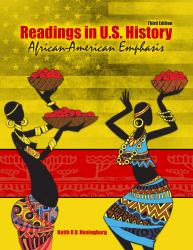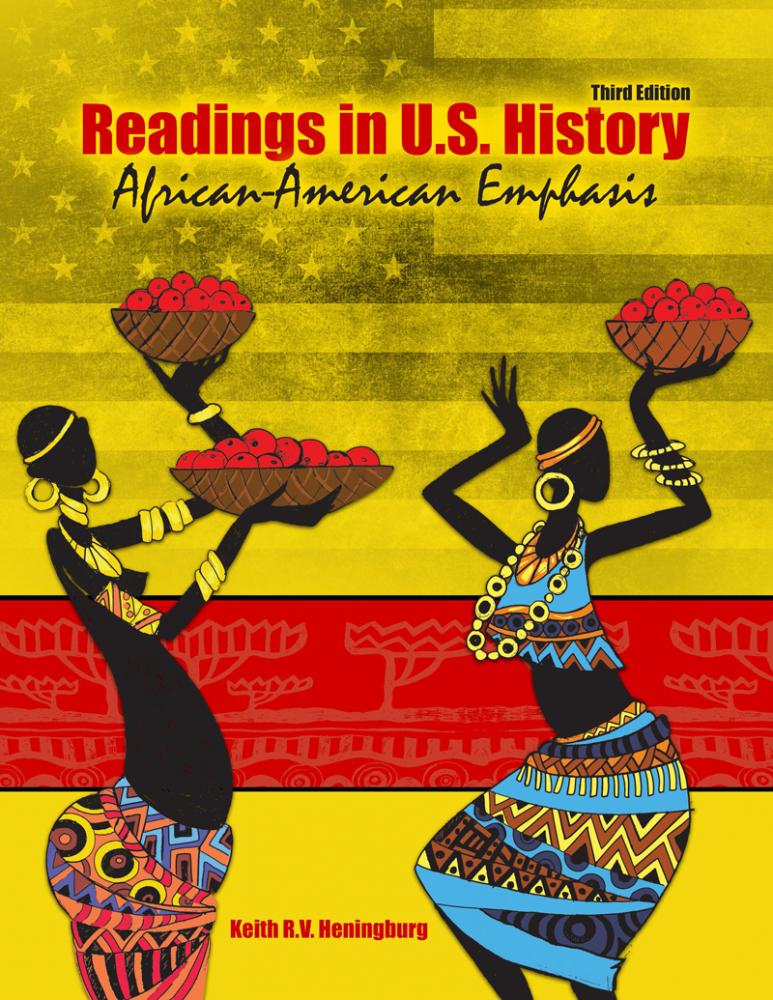Readings In US History: African-American Emphasis
Author(s): Keith Heningburg
Edition: 3
Copyright: 2021
Pages: 286
Edition: 2
Copyright: 2015
Pages: 422
Choose Your Format
Choose Your Platform | Help Me Choose
Readings In US History: African-American Emphasis provides a deep dive into monumental points of U.S. history. The text specifically focuses on the African-American perspective, and readings are centered around the African-American experience. The readings cover important points in U.S. history, including slavery and Civil Rights eras. Students will finish the text with a deeper understanding of the African-American experience throughout U.S. history.
Chapter One—African Slavery
Introduction to Chapter One
“The Era of the Slave Trade,” in Africa and Africans, by Paul Bohannan & Philip Curtin
“Native American and African American Slavery: A Comparison,” by Keith R. V. Heningburg
Chapter Two—Slavery and Labor in Colonial America
Introduction to Chapter Two
“The First Blacks Arrive in Virginia” John Rolfe to Sir Edwin Sandys
“Early Negro Petitions for Freedom, 1661–1726” Herbert Aptheker, ed
“Statements of Slave Rebels, 1741” by Herbert Aptheker, ed
“The Development of Racism and Class Distinction in the 17th Century Chesapeake,” by Keith R. V. Heningburg
“The Problem of Upward Mobility in Colonial America,” by Keith R. V. Heningburg
Chapter Three—The American Revolution
Introduction to Chapter Three
“The Revolutionary War as a Black Declaration of Freedom” by Benjamin Quarles
“The Problem of Egalitarianism for African Americans in Revolutionary War America,” by Keith R. V. Heningburg
“Slaves Petition for Freedom During the Revolution, 1773–1779” by Herbert Aptheker, ed
“Gaining Freedom During the Revolution, 1779–1784” by Herbert Aptheker, ed
“Negroes Protest against Taxation without Representation, 1780” by Herbert Aptheker, ed
Articles of Confederation, 1777
The U.S. Constitution, 1787
The U.S. Bill of Rights, 1791
Chapter Four— Slave Resistance, the Abolition Movement, Manifest Destiny, and Women’s Rights
Introduction to Chapter Four
“The Hypocrisy of Whites, 1829,” by David Walker
“To the Public, 1831,” by William Lloyd Garrison
“The Emergence of Political Abolitionism, 1837–1839,” by Elizur Wright
“A Call for Slave Revolution, 1843,” by Henry Highland Garnet
“The Confession of Nat Turner,” by Nat Turner
“What to the Slave is the Fourth of July?” (July 5, 1852) by Frederick Douglass
“Declaration of Sentiments, Seneca Falls, New York, 1848.”
“The Irish and the Unknown “Other”: Blacks and the Irish in 19th Century San Francisco” by Keith R.V. Heningburg
“Anglo-Saxons and Mexican” by Reginald Horsman
“Race, Expansion, and the Mexican War” by Reginald Horsman
Chapter Five—The Road to Civil War
Introduction to Chapter Five
“Speech on the Repeal of the Missouri Compromise,” by Abraham Lincoln
“Dred Scott v. Sandford,” SCOTUS
“House Divided, Speech,” by Abraham Lincoln
“The Lincoln-Douglas Debates”
“Declaration of the Immediate Causes Which Induce and Justify the Secession of South Carolina from the Federal Union,” adopted Dec. 24, 1860, by C.C Memminger
Chapter Six—The Civil War and Reconstruction
Introduction to Chapter Six
“First Inaugural Speech, March 4, 1861” President Abraham Lincoln
“Provisional Congress of the Confederate States, First Session February 4, 1861 – March 16, 1861, in the Capitol of the State of Alabama”
“Cornerstone Speech, Savannah, Georgia March 21, 1861” by Alexander H. Stephens
“Final Emancipation Proclamation, January 1, 1863” by President Abraham Lincoln
“Proclamation of Amnesty and Reconstruction, December 8, 1863” by President Abraham Lincoln
“Proclamation Concerning Reconstruction, 1864,” by President Abraham Lincoln
“Wade-Davis Bill, 1864” by Melvin I. Urofsky, ed
“Wade-Davis Bill Manifesto, 1864” by Melvin I. Urofsky, ed
“Second Inaugural Address, March 4, 1865,” by President Abraham Lincoln
“First Annual Address to Congress, December 4, 1865,” by President Andrew Johnson, Richard N. Current, ed
“Black Codes, 1865,” by Richard N. Current, ed
“Black Codes of Mississippi, 1865,” by State of Mississippi
“Louisiana Black Codes, 1865,” by State of Louisiana
“Radical Reconstruction, 1867–1877,” by Richard N. Current, ed
Chapter Seven— The Reconstruction Amendments and Civil Rights Acts
Introduction to Chapter Seven
“13th Amendment to the US Constitution, December 18, 1865”
“14th Amendment to the US Constitution, July 28, 1868”
“15th Amendment to the US Constitution, March 30, 1870”
“Civil Rights Act, 1866, 1870, 1871, and 1875”
Chapter Eight—Negro Uplift v Jim Crow
Introduction to Chapter Eight
“Buffalo Soldiers: Reconstruction and the Indian Wars,” by Lt. Col. (Ret) Michael Lee Lanning
“Speech at the Atlanta Cotton Exposition, 1895” by Booker T. Washington
“Plessy v. Ferguson, 1896”
“The Souls of Back Folk, 1903” by W.E.B. Dubois
“The Boycott Movement Against Jim Crow Streetcars in the South, 1900–1906” by August Meier and Elliot Rudwick
“Denouncing Lynching and Racism, 1918” by Herbert Aptheker, ed
Chapter Nine—The Great Depression, 1929–1940
Introduction to Chapter Nine
“A Worse Depression,” by Robert McElvaine
Chapter Ten— The Election of 1948, Brown v Board of Ed, Topeka, KA, 1954–1955 and Beyond
Introduction to Chapter Ten
“Nineteen Forty-Eight – The Opening of the Breach,” by Jack Bloom
“Brown v. Board of Education, Topeka Kansas I and II” SCOTUS
“The Impact of Brown on the Education of Latinos,” by A. Reynaldo Contreras and Leonard A. Valverde
Chapter Eleven— The Modern Civil Rights Movement, 1955–1965
Introduction to Chapter Eleven
“The Cradle Rocks” by Harvard Sitkoff
“Opening of a Curtain” by Joe B. Frantz
“President Lyndon B. Johnson, 1964 Commencement Address at Howard University”
“Mississippi Blacks and the Voting Rights Act of 1965” by Paul E. Joubert and Ben M. Crouch
Chapter Twelve —Civil Rights Acts of the 1960s
Introduction to Chapter Twelve
http://www.african-american-civil-rights.org/civil-rights-act-of-1957
http://www.african-american-civil-rights.org/civil-rights-act-of-1960
http://www.african-american-civil-rights-org/civil-rights-act-of-1964
Voting Rights Act of 1965 – African American Civil Rights Movement (african-american-civil-rights.org)
(1968) Civil Rights Act/Fair Housing Act (blackpast.org)
Readings In US History: African-American Emphasis provides a deep dive into monumental points of U.S. history. The text specifically focuses on the African-American perspective, and readings are centered around the African-American experience. The readings cover important points in U.S. history, including slavery and Civil Rights eras. Students will finish the text with a deeper understanding of the African-American experience throughout U.S. history.
Chapter One—African Slavery
Introduction to Chapter One
“The Era of the Slave Trade,” in Africa and Africans, by Paul Bohannan & Philip Curtin
“Native American and African American Slavery: A Comparison,” by Keith R. V. Heningburg
Chapter Two—Slavery and Labor in Colonial America
Introduction to Chapter Two
“The First Blacks Arrive in Virginia” John Rolfe to Sir Edwin Sandys
“Early Negro Petitions for Freedom, 1661–1726” Herbert Aptheker, ed
“Statements of Slave Rebels, 1741” by Herbert Aptheker, ed
“The Development of Racism and Class Distinction in the 17th Century Chesapeake,” by Keith R. V. Heningburg
“The Problem of Upward Mobility in Colonial America,” by Keith R. V. Heningburg
Chapter Three—The American Revolution
Introduction to Chapter Three
“The Revolutionary War as a Black Declaration of Freedom” by Benjamin Quarles
“The Problem of Egalitarianism for African Americans in Revolutionary War America,” by Keith R. V. Heningburg
“Slaves Petition for Freedom During the Revolution, 1773–1779” by Herbert Aptheker, ed
“Gaining Freedom During the Revolution, 1779–1784” by Herbert Aptheker, ed
“Negroes Protest against Taxation without Representation, 1780” by Herbert Aptheker, ed
Articles of Confederation, 1777
The U.S. Constitution, 1787
The U.S. Bill of Rights, 1791
Chapter Four— Slave Resistance, the Abolition Movement, Manifest Destiny, and Women’s Rights
Introduction to Chapter Four
“The Hypocrisy of Whites, 1829,” by David Walker
“To the Public, 1831,” by William Lloyd Garrison
“The Emergence of Political Abolitionism, 1837–1839,” by Elizur Wright
“A Call for Slave Revolution, 1843,” by Henry Highland Garnet
“The Confession of Nat Turner,” by Nat Turner
“What to the Slave is the Fourth of July?” (July 5, 1852) by Frederick Douglass
“Declaration of Sentiments, Seneca Falls, New York, 1848.”
“The Irish and the Unknown “Other”: Blacks and the Irish in 19th Century San Francisco” by Keith R.V. Heningburg
“Anglo-Saxons and Mexican” by Reginald Horsman
“Race, Expansion, and the Mexican War” by Reginald Horsman
Chapter Five—The Road to Civil War
Introduction to Chapter Five
“Speech on the Repeal of the Missouri Compromise,” by Abraham Lincoln
“Dred Scott v. Sandford,” SCOTUS
“House Divided, Speech,” by Abraham Lincoln
“The Lincoln-Douglas Debates”
“Declaration of the Immediate Causes Which Induce and Justify the Secession of South Carolina from the Federal Union,” adopted Dec. 24, 1860, by C.C Memminger
Chapter Six—The Civil War and Reconstruction
Introduction to Chapter Six
“First Inaugural Speech, March 4, 1861” President Abraham Lincoln
“Provisional Congress of the Confederate States, First Session February 4, 1861 – March 16, 1861, in the Capitol of the State of Alabama”
“Cornerstone Speech, Savannah, Georgia March 21, 1861” by Alexander H. Stephens
“Final Emancipation Proclamation, January 1, 1863” by President Abraham Lincoln
“Proclamation of Amnesty and Reconstruction, December 8, 1863” by President Abraham Lincoln
“Proclamation Concerning Reconstruction, 1864,” by President Abraham Lincoln
“Wade-Davis Bill, 1864” by Melvin I. Urofsky, ed
“Wade-Davis Bill Manifesto, 1864” by Melvin I. Urofsky, ed
“Second Inaugural Address, March 4, 1865,” by President Abraham Lincoln
“First Annual Address to Congress, December 4, 1865,” by President Andrew Johnson, Richard N. Current, ed
“Black Codes, 1865,” by Richard N. Current, ed
“Black Codes of Mississippi, 1865,” by State of Mississippi
“Louisiana Black Codes, 1865,” by State of Louisiana
“Radical Reconstruction, 1867–1877,” by Richard N. Current, ed
Chapter Seven— The Reconstruction Amendments and Civil Rights Acts
Introduction to Chapter Seven
“13th Amendment to the US Constitution, December 18, 1865”
“14th Amendment to the US Constitution, July 28, 1868”
“15th Amendment to the US Constitution, March 30, 1870”
“Civil Rights Act, 1866, 1870, 1871, and 1875”
Chapter Eight—Negro Uplift v Jim Crow
Introduction to Chapter Eight
“Buffalo Soldiers: Reconstruction and the Indian Wars,” by Lt. Col. (Ret) Michael Lee Lanning
“Speech at the Atlanta Cotton Exposition, 1895” by Booker T. Washington
“Plessy v. Ferguson, 1896”
“The Souls of Back Folk, 1903” by W.E.B. Dubois
“The Boycott Movement Against Jim Crow Streetcars in the South, 1900–1906” by August Meier and Elliot Rudwick
“Denouncing Lynching and Racism, 1918” by Herbert Aptheker, ed
Chapter Nine—The Great Depression, 1929–1940
Introduction to Chapter Nine
“A Worse Depression,” by Robert McElvaine
Chapter Ten— The Election of 1948, Brown v Board of Ed, Topeka, KA, 1954–1955 and Beyond
Introduction to Chapter Ten
“Nineteen Forty-Eight – The Opening of the Breach,” by Jack Bloom
“Brown v. Board of Education, Topeka Kansas I and II” SCOTUS
“The Impact of Brown on the Education of Latinos,” by A. Reynaldo Contreras and Leonard A. Valverde
Chapter Eleven— The Modern Civil Rights Movement, 1955–1965
Introduction to Chapter Eleven
“The Cradle Rocks” by Harvard Sitkoff
“Opening of a Curtain” by Joe B. Frantz
“President Lyndon B. Johnson, 1964 Commencement Address at Howard University”
“Mississippi Blacks and the Voting Rights Act of 1965” by Paul E. Joubert and Ben M. Crouch
Chapter Twelve —Civil Rights Acts of the 1960s
Introduction to Chapter Twelve
http://www.african-american-civil-rights.org/civil-rights-act-of-1957
http://www.african-american-civil-rights.org/civil-rights-act-of-1960
http://www.african-american-civil-rights-org/civil-rights-act-of-1964
Voting Rights Act of 1965 – African American Civil Rights Movement (african-american-civil-rights.org)
(1968) Civil Rights Act/Fair Housing Act (blackpast.org)



